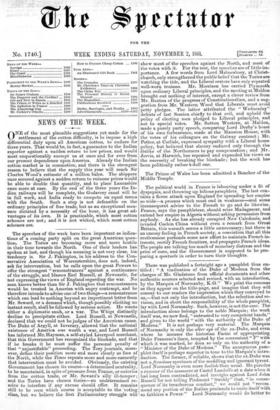The speeches of the week have been important as indica-
tions of a coming party split on the great American ques- tion. The Tories are becoming more and more hostile in their tone towards the North. One of their leaders has spoken at last, and though his meaning is not very clear, his tendency is. Sir J. Pakington, in his address to the Con- • servative Association of Worcestershire, does not, indeed, ask for intervention, but he calls upon the great Powers to offer the strongest " remonstrances' against a continuance of the struggle, and blames Earl Russell, at Newcastle, for not expressing the views of England regarding the war. No man knows better than Sir J. Pakington that remonstrances would, be treated in America with angry contempt, and he therefore intends to advise one of two things—a remonstrance which can lead to nothing beyond an impertinent letter from Mr. Seward, or a demand which, though possibly eliciting no instant result, shall be followed by serious action. He wants either a diplomatic snub, or a war. The Whigs distinctly decline to precipitate either. Lord Russell, at Newcastle, declared that we could not be judges of the American cause. The Duke of Argyll, at Inverary, allowed that the national existence of America was worth a war, and Lord Russell has informed Mr. Hayman, a self-styled Liverpool merchant, that this Government has recognized the blockade, and that if he breaks it he must suffer the personal penalty of that "unjustifiable" proceeding. The Tory journals, more- over, define their position more and more clearly as foes of the North, while the Times repeats more and more earnestly that intervention must be avoided. Obviously, the existing Government has chosen its course—a determined neutrality, to be maintained, in spite of pressure from France, or outcries from the cotton trade, or Mr. Seward's silly ill-temper; and the Tories have chosen theirs—an undetermined re- solve to interfere if any excuse should offer. ,It remains still to be seen which course is acceptable to the voting class, but we believe the first Parliamentary struggle will show most of the speeches against the North, and most of the votes with it. For the rest, the speeches are of little im- portance. A few words from Lord Malmesbury, at Christ- church, only strengthened the public belief that the Tories are watching the tide, and the Liberal orators have only repeated well-worn truisms. Mr. Morrison has carried Plymouth upon ordinary Liberal principles, and the meeting at Malden brought out nothing of interest, except a clever review from Mr. Buxton of the progress of Constitutionalism, and a sug- gestion from Mr. Western Wood that Liberals must avoid petty pledges. The latter attributed the " Wednesday" defeats of last Session chiefly to that evil, and upheld the policy of electing men pledged to Liberal principles, and not to special votes. Mr. Sutton Western, at Maldon, made a purely party speech, comparing Lord Derby's boast of his own forbearance, made at the Mansion House, with the votes of his colleagues on the Galway contract ; Mr. Potter, at Carlisle, expressed sympathy with a Liberal home policy, but believed that slavery endured only through the dislike of the Northerners to pay compensation; and Mr. Jervis, at Harwich, has repeated and expanded his views on the necessity of breaking the blockade; but the week has been politically rather h dull one.






























